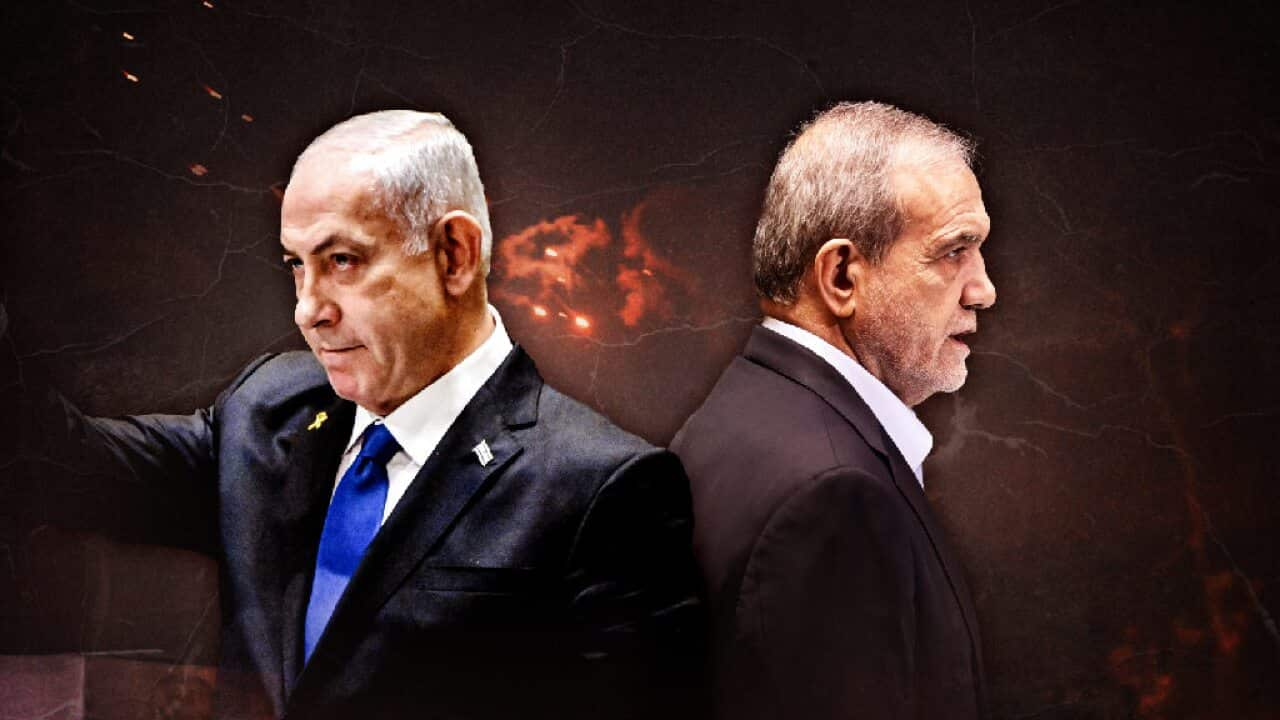Israel has vowed to retaliate after Iran's missile attack, which some experts have described as a game-changing tactics shift for the country which has said it wants to avoid a regional war.
Iran fired nearly 200 missiles at Israel overnight — most of which were shot down by Israel's Iron Dome defence system. No injuries were reported in Israel, but one man was killed in the occupied West Bank, authorities there said.
Iran said that marked the end of its attack and there would be "vast destruction" if Israel retaliated.
Despite the warning, Israeli Prime Minister Benjamin Netanyahu his country's forces will retaliate, saying Iran had made a — with the United States pledging to back him.
The attack follows Israel's July assassination of in Iran's capital, Tehran, and more recently its killings of — the leader of — and a general in .
Hamas and Hezbollah — both of which Australia, the United States, and the United Kingdom have listed as terrorist groups — are allies of Iran, which also financially backs Hezbollah.
Some experts say the strike against Israel marks a change of approach for Iran, which has previously signalled that it wants to avoid widespread conflict in the region.
"We know more than anyone else that if a larger war were to erupt in the Middle East, it will not benefit anyone throughout the world. It is Israel that seeks to create this wider conflict," Iranian President Masoud Pezeshkian told the United Nations General Assembly last month.
Following Iran's attack on Israel, Pezeshkian posted on social media to say his country had the right to defend itself.
Shahram Akbarzadeh, a professor of Middle East politics at Deakin University, described Iran's overt involvement in the recent missile strikes as opening a new chapter.
"Iran has traditionally refrained from this type of operation, it is a game changer," he said.
A 'powerful' ally
Hezbollah is based in part across southern Lebanon along the Israeli border.
The group has been behind several high-profile attacks against Israel. Its cross-border raid into Israel sparked the deadly 2006 Lebanon War.
On Wednesday, Israel carried out five strikes in Beirut's southern suburbs, targeting Hezbollah sites, according to Agence France-Presse.
That followed Israel's killing of Nasrallah, which Eyal Mayroz from the University of Sydney described as a severe blow to Iran.
"Hezbollah is the dearest and most powerful ally to Iran out of its proxies," the peace and conflict studies expert said.

Nearly a million people are estimated to have been displaced by Israeli airstrikes across Lebanon. Source: SBS News
A moderate show of Iranian strength
The Israeli attacks in Lebanon left Iran in an uncertain position, Mayroz said.
"On one side, if Iran retaliates it will get on the wrong foot with the US and the Gulf states, undermining its foreign agenda," he said.
"But if they didn't retaliate it would hurt its reputation and signal that Iran won't help its allies."
Mayroz believes the missile strike against Israel was a moderate show of strength and support for Hezbollah, rather than a means of escalating conflict.
"I have a feeling their (Iran's) reaction was trying to avoid a full-scale attack."
Israeli retaliation could be 'tenfold'
Akbarzadeh said Israel has typically targeted areas believed to harbour Hezbollah, but now has justification to turn its attention to the Iranian capital of Tehran.
"Iran is now likely to suffer direct Israeli retaliation, and Israel certainly has the capacity to target and damage them," he said.
"You can bet there will be ongoing retaliation from Benjamin Netanyahu, and it will be tenfold."
Could the United States get involved?
The United States has voiced its support for Israel.
President Joe Biden has described Iran's attack as "ineffective" while vice president Kamala Harris said Iran is a "destabilising, dangerous force in the Middle East".
Akbarzadeh believes the US has given Israel freedom to do what it pleases in the region, including incursions into Gaza and Lebanon.
"The US has shown full support of Israel consistently, and if the US becomes more involved it could lead to full-scale conflict," he said.
Australia, the US and the European Union were among the nations to back , which Netanyahu rejected.
Akbarzadeh said Israel has goaded Iran into attacking directly, to force a response from the US.
"This is all playing into Netanyahu's hands, Iran is playing by his playbook. He wants the US to join this conflict, and that's likely to happen," he said.
"An escalation of conflict or war will have devastating consequences for the region economically."
Mayroz said the US putting soldiers on the ground in Lebanon was unlikely.
"I think the Americans are cautious and angry at Israel's actions in the region," he said.
"Any escalation in the area could affect petrol prices in the US, which they would want to avoid with the upcoming election.
"But they will likely continue to support Israel with ammunition to keep its supporters onside for the election."

